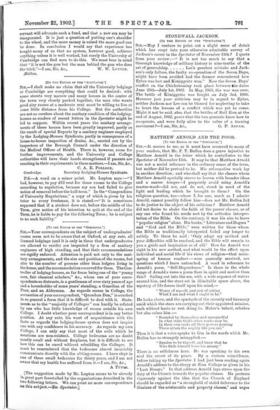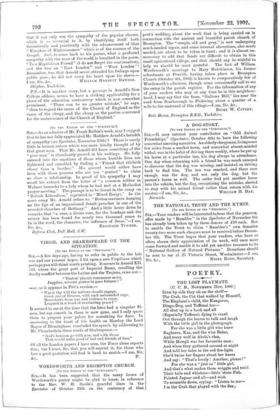MATTHEW ARNOLD AND THE POOR.
[TO THE EDITOR OF TEE "SPECTATOR."] SIL—It occurs to me, as it must have occurred to many of
your readers, that Mr. F. T. Bullen does a grave injustice to Matthew Arnold in the letter which he contributes to the
Spectator of November 15th. It may be that Matthew Arnold was not a social reformer in the ordinary sense of the term, but neither did he pretend to be. His reformative work lay in another direction ; and who shall say that the classes whom
Matthew Arnold specially strove to leaven with broader ideas and a suaver temper—I purposely avoid using Arnold's master-word—did not, and do not, stand in need of the light and leading which he brought to them ? On the religious question, too—where I, for one, much as I admire Arnold, cannot possibly follow him—does not Mr. Bullen fail to do justice to the object of his criticism ? Matthew Arnold did not desire to shake the faith of the poorer classes, or of any one who found his needs met by the orthodox interpre- tation of the Bible. On the contrary, it was his aim to leave " popular religion" alone. His books, " Literature and Dogma " and " God and the Bible," were written for those whom the Bible as traditionally interpreted failed any longer to satisfy. To these lie said : Only adopt my method and your difficulties will be resolved, and the Bible will remain to you a guide and inspiration as of old.' How far Arnold was right in his new method, and what would be the effect upon
individual and social life if his views of religion—that main- spring of human conduct—were generally received, are questions which I leave untouched. A word in reference to Arnold's poem, " Self-Dependence." Is there in the whole range of Arnold's verse a poem finer in spirit and motive than this Sailing out into the sea, with a wide expanse of waters around him, and the stars set in illimitable space above, the mystery of life forces itself upon his mind,— "Weary of myself, and sick of asking What I am and what I ought to be."
He looks above, and the spectacle of the serenity and harmony amid which the stars are carrying out their appointed mission, each without haste or rest doing its Maker's behest, rebukes
but also calms him :-
" Bounded by themselves and unregardful In what state God's other works may be, In their own tasks all their powers pouring These attain the mighty life you see."
Then it is that a voice speaks to him in the words which Mr. Bullen has so strangely misapplied :—
" Resolve to be thyself, and know that he Who finds himself loses his misery."
There is no selfishness here. He was speaking to his own soul the secret of its peace. By a curious coincidence, before taking up the Spectator I had just been reading again Arnold's address to the clergy at Sion College as given in his "Last Essays." In that address Arnold lays stress upon the duty of the Church towards the popular classes. He protests vigorously against the idea that the Church of England should be regarded as "a stronghold of stolid deference to the illusions of the aristocratic and property classes," and urges
that it can only win the sympathy of the popular classes, which is so essential to it, by identifying itself both theoretically and practically with the advancement of that " Kingdom of Righteousness " which is of the essence of the Gospel. And, to come back to his poems, what a profound sympathy with the woes of the world is breathed in the poem, " To a Republican Friend" (I do not forget the continuation), and the two on " East London" and " West London " ! Remember, too, that Arnold never obtruded his feelings upon public gaze ; he did not carry his heart upon his sleeve.— Skipton, Yorkshire. I am, Sir, &e., WILLIAM HARBUTT DAWSON.
P.S.—It is another story, but a passage in Arnold's Sion College address seems to have a striking applicability for a phase of the education controversy which is now somewhat prominent. " There can be no greater mistake," he says, " than to regard the cause of the Church of England as the cause of the clergy, and the clergy as the parties concerned for the maintenance of the Church of England."











































 Previous page
Previous page